
Ecolab Manufacturing Plant in Taicang, China, Certified as Water Stewardship Leader
Implementation of world-leading water stewardship results in benefits for business and community.
Published March 4, 2015 | Updated March 1, 2017
Summary
At Ecolab, the global leader in water, hygiene and energy technology and services, providing and protecting vital resources is core to the company’s purpose. So it only makes sense that Ecolab is dedicated to water stewardship, not only through the company’s work with customers, but also within its own operations.
As such, Ecolab was a founding partner of the Alliance for Water Stewardship (AWS) and piloted the AWS International Water Stewardship Standard (Standard), a global set of principles and criteria that are environmentally, socially and economically beneficial. The Standard, which was developed with input from founding partners and multiple stakeholders, provides water stewards with a six-step continual improvement framework at a site and catchment level that enables facilities to commit, understand, plan, implement, evaluate and communicate water stewardship actions to ultimately ensure communities have a resilient future.
From 2013-2015, Ecolab partnered with World Wildlife Fund (WWF), another AWS founding partner, to pilot the framework at its manufacturing plant in Taicang, China, a water-sensitive area in the Taihu Basin of the Yangtze River delta. The pilot helped influence the final Standard and build momentum for broader adoption of the Standard both locally and globally. In September 2015, Ecolab’s Taicang plant became the first facility in the world to be AWS certified.
Background
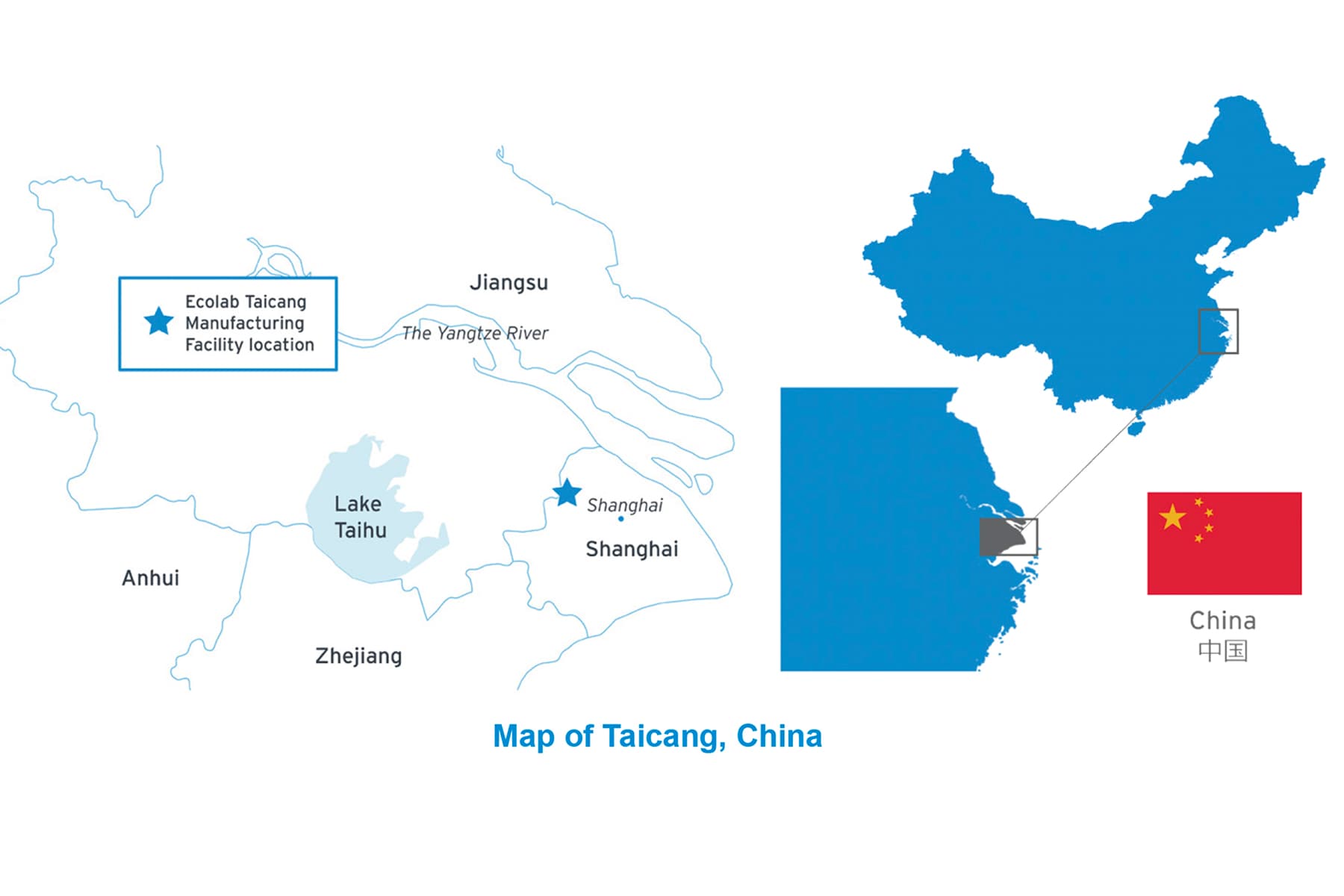
Situation
The zero-discharge plant, which opened in 2012, is located near Shanghai in the Taihu Basin, which is comprised largely of the Yangtze River delta.
The Taihu Basin is economically, socially and environmentally important to China. Accounting for approximately 25 percent of China’s gross domestic product (GDP), the Taihu Basin supports roughly 140 million people and has a rich cultural history. The region suffers from all forms of physical water risk: flooding, saltwater intrusion, droughts and significant water quality challenges. The Chinese government has taken steps to address these concerns and has placed stringent requirements on new industrial facilities in the watershed, including a zero-discharge mandate.
Government-Related Initiatives
In addition to the work done inside the plant, the process of implementing the water stewardship plan resulted in greater understanding of ongoing, external, government-related initiatives that support efforts to manage operating risks, including:
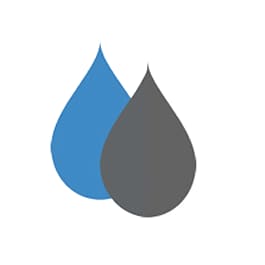
Domestic Wastewater Management and collection within the industry park through a pipe network that directs water to a municipal wastewater plant for treatment, minimising disruption or rivers.
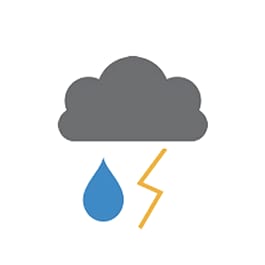
Storm Water Management: preventing untreated runoff to discharge into the river. All manufacturing plants have been asked to build storm water tanks.
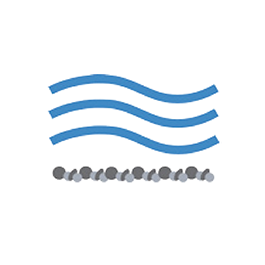
River Sediment Management: Local government cleans up river sediment every three to five years, helping return to the water to its natural state. The Nan Hun River, the small river near Ecolab’s plant, had sediment removed in 2014.
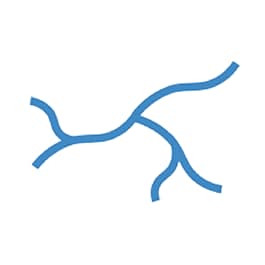
River Re-connectivity Management: Reconnection of river sections within the industrial park to restore the natural conditions of the rivers.
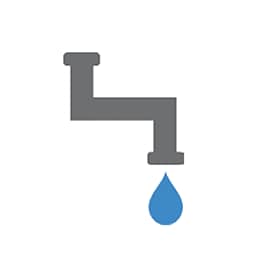
Sewage Main Pipe Network: A sewage collection main pipe network for the industrial park (completed in 2014) that allows wastewater discharge from plants to be collected and sent to a local wastewater treatment plant.

One plant, One Pipe: All plants in the development zone are required to discharge wastewater through a dedicated pipe that connects to the main network. An online device will be installed to monitor the quality of wastewater discharged from individual plants, including Ecolab’s plant.
Water Stewardship in Action
Commit, Gather and Plan
An initial water impact assessment was conducted which included a review of the plant’s operations, its surroundings and existing water management efforts. This exercise provided the team with baseline details on leadership commitment, water balance and water quality as well as insight into critical water-related areas of the Taihu Basin. Using the WWF Water Risk Filter and other assessment tools, the team identified water risks, opportunities and shared community and government challenges. Throughout the journey, updates were shared with stakeholders throughout Ecolab, who were committed to a positive outcome.
After information was gathered, the team formulated a water stewardship plan for the facility designed to mitigate water risks, identify cost savings and address water challenges faced by the site and local catchment.
Implement
In 2013 and 2014, Ecolab implemented its water stewardship plan, which included projects to improve the plant’s operational efficiency and water conservation efforts. The plan also included community water infrastructure initiatives focused on collaboration with the local government on river management in the catchment area.
Ecolab implemented site-specific water efficiency and quality improvement projects that helped reduce overall water usage and operating costs, including:
- An optimised intermediate bulk container (IBC) cleaning process through increasing the pressure of cleaning water, changing the shower heads and shortening cleaning times
- Reduced cleaning frequency and cleaning time of product holding tanks and fillers (from 41 minutes to 36 minutes)
- Reused process wash water, achieved by establishing a standard and installing tanks for reused water
- Replaced wastewater treatment plant defoamer product to improve membrane performance
- Installed water meters to provide accurate water consumption rate data, informing strategies to improve future water usage
Evaluate Results
There are and will continue to be many benefits of the water stewardship work undertaken by Ecolab and WWF. Below summarizes a few key outcomes by each stakeholder group.
Communicate
Disclosure allows others to make informed decisions on a site’s operations and tailor their involvement to suit. The AWS Standard is intended to encourage transparency and accountability through communication of performance relative to commitments, policies and plans. Ecolab communicated progress on implementation of its water stewardship plan with internal and external stakeholders such as WWF China, The Nature Conservancy and other public sector agencies. In addition, Ecolab communicates AWS activities within annual sustainability reporting initiatives.
By sharing catchment information and water plans with other water users, Ecolab can help others manage their operating risks and implement water stewardship activities.
| ECOLAB MANUFACTURING PLANT | WWF | CHINESE GOVERNMENT |
|
Improved water efficiency and reduced costs:
|
Enhanced wetland habitats through Wetland 1+1 programme | Reduced system burden through less water use |
| Improved relationships with civil society groups and government officials | Initiated collective action within Taicang Chemical Manufacturing Zone | Improved relationships with civil society groups and local businesses |
| Helped promote the importance of water stewardship activities to manage risks | Influenced corporate advocacy efforts to address shared water challenges | Received consultative support to deliver on public sector goals related to water quality and balance |
| Prevented untreated discharge to the river and increased water availability from storm water collection | Improved understanding of corporate operations and needs | Improved understanding of corporate operations and needs |
| Shared key learnings to more quickly implement the AWS standard at other Ecolab plants | Started an aggregation of data on the local catchment’s water stewardship activities | Started an aggregation of data on the local catchment’s water stewardship activities |
| Improved engagement of Ecolab associates through communication of efforts | Provided real-time training and additional water stewardship insight for future AWS Standard implementation | Provided real-time training and additional water stewardship insight for future AWS Standard implementation |
Ongoing Water Stewardship
In July 2015, Ecolab’s Taicang facility engaged TÜV Rheinland, a third-party AWS accredited organisation, to assess compliance with the AWS Standard. In September 2015, TÜV Rheinland declared Ecolab’s manufacturing plant in Taicang as “AWS Core level compliant,” making this plant the first facility in the world to be AWS certified.
The journey is far from over. The team in Taicang and at all Ecolab facilities around the world continue to pursue water stewardship projects and facilitate discussions internally and externally to help drive collective action in the catchments and communities in which Ecolab operates.
Our Partners:
Alliance for Water Stewardship | World Wildlife Fund | Chinese Government | TÜV Rheinland


